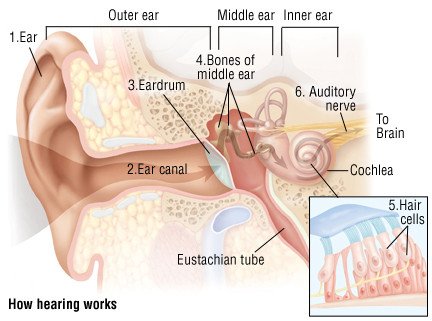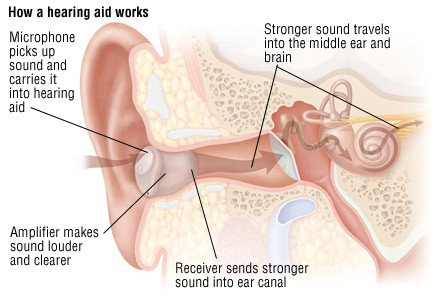Hearing Loss in Adults
Medically reviewed by Drugs.com. Last updated on Feb 15, 2024.
What is Hearing Loss in Adults?

Hearing loss is a decrease in the ability to perceive sounds. It can be partial or total, sudden or gradual, temporary or permanent. It can affect one ear or both. In general, the risk of hearing loss increases with age.
Sound enters the ear and strikes the eardrum. This causes the eardrum to vibrate. The eardrum's vibrations are amplified through the middle ear by three tiny bones. Inside the ear, the vibrations are transformed into nerve impulses. These nerve impulses travel to the brain, where they are interpreted as sounds.
|
|
The outer ear and middle ear conduct sound. Any injury to this part of the hearing pathway is called conductive hearing loss. Sensorineural hearing loss is injury to the inner ear, eighth cranial nerve and brain. These structures produce, transmit and interpret nerve impulses.
Some of the most important causes of hearing loss in adults are:
-
Middle ear disease — A bacterial infection of the middle ear can:
-
injure the eardrum
-
disrupt the middle-ear bones
-
cause fluid buildup
-
-
Noise — Loud sounds can injure delicate cells within the ear. This is a form of sensorineural hearing loss. Noise-induced hearing loss can happen because of a single brief burst of an extremely loud sound. It more often results from long-term exposure to loud sounds of slightly lower intensity.
-
Otosclerosis —An abnormal overgrowth of one or more bones in the middle ear prevents the small bones from moving normally. This is a type of conductive hearing loss. Otosclerosis often runs in families.
-
Acoustic neuroma — This noncancerous tumor grows on part of the eighth cranial nerve. This nerve carries signals to the brain. Acoustic neuroma often causes dizziness and equilibrium problems in addition to gradual hearing loss.
-
Meniere's disease — This typically causes dizziness, hearing loss, ringing in the ears (tinnitus) and a sensation of fullness or stuffiness in one or both ears. People with Ménière's disease have a buildup of excess fluid within the inner ear.
-
Trauma — Many types of accidents can cause hearing loss. Hearing loss can result when the eardrum is injured from the force of an explosion. Or it can result from a Q-tip that ruptures the eardrum during an attempt to clean the ear canal.
-
Sudden sensorineural hearing loss — This is a medical emergency. A person loses hearing over a period of three days or less. In most cases, only one ear is affected. The underlying problem may be a viral infection.
-
Drugs — Many prescription and nonprescription medications can damage the ear and cause hearing loss. These include high dose aspirin and certain types of:
-
Anticancer chemotherapy drugs
-
Antimalaria drugs
-
Age — Age-related hearing loss (presbycusis) is not a single disease. Rather, it is a category for the cumulative effects of aging on the ears. Hearing loss usually begins after age 60. Both ears are affected. It is typically harder to hear high-pitched tones (women's voices, violins) than low-pitched ones (men's voices, bass guitar). Hearing loss usually occurs gradually over a period of years. The person may not realize that he or she has difficulty hearing.
-
Other causes — There are more than 100 different causes of hearing loss in adults. The most common reversible causes are severe buildup of earwax in the ear canal and acute infections of the external ear or middle ear.
Symptoms
If you have sudden, severe hearing loss, you will notice immediately that your ability to hear has decreased dramatically or disappeared totally in the affected ear.
If your hearing loss is gradual, your symptoms may be more subtle. You may have difficulty understanding conversations. Family members may complain that you play the radio or TV too loudly. You may ask them to repeat what they say or frequently misunderstand what they are saying.
Some diseases and conditions that cause hearing loss may produce additional symptoms, including:
-
Ringing in the ears (tinnitus)
-
Discharge or bleeding from the ear
-
Deep earache, or pain in the ear canal
-
Pressure or a "stuffy" feeling inside the ears
-
Dizziness or problems with balance or equilibrium
Diagnosis
Your doctor will ask you to describe your symptoms. He or she will ask if anyone in your family had or has hearing loss. Your doctor will want to know if you have been exposed to loud noises, trauma of the ear or head, or ear infections. Your doctor will want to rule out the possibility that medications may be causing your hearing loss. He or she will review the prescription and over-the-counter drugs you take.
Your doctor will examine you, and look closely at your ears. This ear exam may include:
-
An examination of your ear canal and eardrum using a lighted instrument.
-
The Rinne test. A vibrating tuning fork is placed on the bone behind your ear. This tests for conductive hearing loss.
-
The Weber test. A vibrating tuning fork is placed in the middle of your forehead to help diagnose one-sided hearing loss.
-
Audioscopy testing. The doctor uses a hand-held device to generate tones of various intensities to find out if you can hear them.
If you are diagnosed with hearing loss, your doctor will refer you to an audiologist. The audiologist will test your hearing sensitivity. He or she will check for middle-ear problems by measuring your eardrum's ability to reflect sounds. Further testing and treatment will follow.
Expected Duration
The duration of hearing loss depends on its cause. Sensorineural hearing loss tends to be permanent.
Prevention
You can help prevent hearing loss:
-
Wear protective earplugs or earmuffs if you are often exposed to loud noise at work or during recreational activities.
-
Never put cotton swabs or other foreign objects in your ears.
-
Wear a seatbelt while driving. Wear a protective helmet while riding a bicycle.
-
Know the possible side effects of your medications.
Treatment
Both age-related and noise-related hearing loss tend to be permanent. Your doctor may recommend a hearing aid or an implant to improve your ability to communicate with others. A hearing aid amplifies sounds electronically and is effective for many people with age-related hearing loss. Hearing aids today are very small, so small that other people often do not notice you are wearing them. A cochlear implant translates sounds into electrical signals that can be carried to the brain.
|
|
Certain other forms of hearing loss may be treated medically or surgically:
-
Otosclerosis — For mild cases, a hearing aid is usually the first option. In severe cases, one of the small bones is surgically replaced with a tiny prosthesis.
-
Acoustic neuroma — Treatment includes surgery or highly focused radiation therapy.
-
Ménière's disease — There is no cure. The goal of treatment is to relieve pressure in the ears to reduce symptoms. Some people improve by limiting intake of salt, caffeine or alcohol or quitting smoking. Medications to reduce fluid retention in the ear may help. In some cases, surgery may be considered.
-
Traumatic hearing loss — A damaged eardrum can sometimes be repaired surgically.
-
Drug-induced hearing loss — Stopping the problem medication may reverse hearing loss or prevent it from getting worse.
-
Sudden sensorineural hearing loss — When the cause is unknown, this condition is usually treated with a corticosteroid, such as prednisone.
-
Other — A dense plug of earwax can be dissolved or gently removed by your doctor. Antibiotics can treat hearing loss caused by ear infections.
When To Call a Professional
Call your doctor immediately if you have sudden hearing loss. This is a medical emergency.
Also, make an appointment to see your doctor if:
-
You are an older adult, and hearing loss interferes with your quality of life.
-
You work in a high-noise environment, and you have trouble hearing.
-
You have hearing loss together with:
-
an earache
-
discharge from your ears
-
tinnitus
-
dizziness or balance problems
-
Prognosis
The prognosis is highly variable. In many cases, hearing loss cannot be treated with medications or surgery. But your quality of life may improve significantly with a hearing aid. A cochlear implant may also be an option.
Additional Info
National Institute on Deafness and Other Communication Disorders
http://www.nidcd.nih.gov/
American Academy of Otolaryngology — Head and Neck Surgery
http://www.entnet.org/
American Speech-Language-Hearing Association (ASHA)
http://www.asha.org/
National Institute for Occupational Safety and Health
http://www.cdc.gov/niosh/
American Tinnitus Association
http://www.ata.org/
Learn more about Hearing Loss
Treatment options
Care guides
Further information
Always consult your healthcare provider to ensure the information displayed on this page applies to your personal circumstances.


